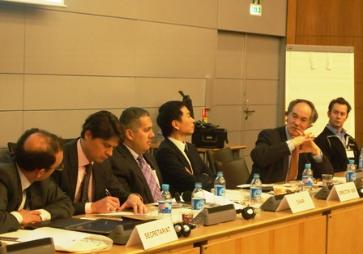Illicit trade
Charting Illicit Trade: Sharing Data and Information
First meeting of the OECD Task Force on Charting Illicit Trade
2-3 April 2013 - Paris, France
BackgroundThe OECD Task Force on Charting Illicit Trade (TF-CIT) is organised in the context of the OECD High Level Risk Forum to foster policy oriented solutions to illicit commercial activity. With the active support of over 90 participants from governments, multinational enterprises, international organisations, think tanks and academia from OECD as well as non-OECD countries, the purpose of the first meeting of the Task Force was to:
|
|
Policy contextThe ability of transnational criminal networks to conduct illicit trade in new markets and exploit weakly governed territories reveals the relative weakness of current governance regimes. To address this quickly evolving global risk, public and private sector actors are collaborating through the TF-CIT. As a first step, it aims to improve understanding amongst policy makers of the magnitude, flows and nature of illicit trade, how it undermines legitimate economic activities, directly harms public health and safety, and contributes to environmental degradation. While gross estimates of monetary values are available for some sectors, a comprehensive and holistic effort is needed to improve the availability and quality of data, to enhance partnerships between the public and private sectors for data sharing, and to conceive new approaches to effective policy strategies. This analysis will also support efforts to tailor effective policy for anti-corruption and stem illicit financial flows. |
|
Next Steps
The Task Force aims to organise a network dialogue on “Counterfeit consumer goods” in Delhi, India, in September 2013, in co-operation with the Federation of Indian Chamber of Commerce and Industry. As an emerging economy and globally strategic market, the illicit trade of fake, counterfeit or smuggled products is considered to be a major challenge to India’s industries. The conference will bring together key stakeholders from a wide range of consumer product industries with policy makers to foster recommendations for initiatives to combat illicit trade in this region.
Documents and Presentations

- (pdf)
- (pdf)
- (pdf)
- (pdf)
- (pdf)
- (pdf)
- (pdf)
- (pdf)
- (pdf)
- (pdf)
Further reading
RELATED WORK
INFORMATION
For any questions or if you require further information please contact: Ms Sabrina Aschemann, OECD: sabrina.aschemann@oecd.org or Mr Jack Radisch, OECD: jack.radisch@oecd.org
Related Documents
